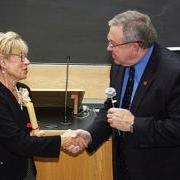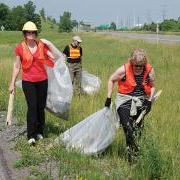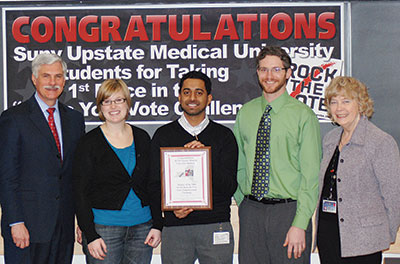|
Political action is much more than meeting with state lawmakers to press the union’s budgetary and legislative priorities. It also involves evaluating the candidates running for election to see where they stand on issues that concern UUP and SUNY. That prompted UUP’s Upstate Medical University (UMU) Chapter to co-sponsor an open forum with candidates in the race for the 119th Assembly District seat. “The nearly 2,600 Upstate Medical University employees we represent wanted to know which candidates would best represent them and the interests of Upstate, the largest employer in Central New York,” UUP President Phil Smith said. “We needed to hear which candidates are sensitive to the needs of the State University of New York, which has been stung by $585 million in budget cuts over the past two years.” FOCUS ED FORUM The forum, organized by UUP and UMU, took place on the UMU campus less than a week before Election Day. It focused on issues germane to the union and Upstate: higher education and health care. “The goal is to increase public awareness of these issues, since they impact all of us,” UMU Chapter President Carol Braund said as she opened the forum. Three of the four Assembly candidates participated. UMU Chapter members and community residents used the forum to ask questions, such as whether the hopefuls would vote for further state budget cuts to SUNY. UUP’s statewide affiliate, NYSUT, had not endorsed a candidate for the Assembly seat, which was won by Democrat Sam Roberts. ASSEMBLYWOMAN HONORED Roberts has big shoes to fill. He takes over in January for retiring Assemblywoman Joan Christensen, to whom UUP and UMU paid tribute during a ceremony preceding the candidates forum. Smith presented Christensen with a certificate of appreciation for her 20 years of public service. “For the UUP members who work at Upstate Medical and the faculty we represent at SUNY, we cannot thank you enough for the work you have done on behalf of our members, students and the state as a whole,” Smith said. Christensen graciously accepted the honor, praising UMU and the role it plays in the lives of the citizens of Central New York. “Thank you for all that you do,” she said. “We depend more on you than you depend on us.” — Donald Feldstein |
Category Archives: Upstate Medical
UMU signed on to clean up
|
Some people adopt children. Others adopt pets. The Upstate Medical University Chapter of UUP has adopted a highway. Well, a one-mile stretch of it at least. A little over five years ago, the Upstate Chapter executive board discussed how they could give back to the community—in ways beyond their day-to-day duties as professionals in an academic medical center. Following the recommendation of a former chapter president, the board decided to adopt a stretch of highway along I-481 near Rock Cut Road in Syracuse. At least twice a year between April and October, the “I-481 Clean Up Krewe” takes to the street to bag trash that collects along their adopted highway. When the weather cooperates, the team cleans up more often. On average, eight UUPers lend a hand to each cleanup effort. UMU Chapter delegate Brian Tappen was among the first to get involved. He wanted to get outside and get his hands dirty, and adopting a highway seemed the perfect fit. “For me personally, it was a combination of things,” said Tappen, a statewide Executive Board member. “I believe in community service, and I wanted to work outside after a long night shift at the hospital.” Fellow UUPer Dawn Leadley believes being part of the I-481 Clean Up Krewe is a win-win situation. “Volunteerism provides rewards not only to individuals and communities, but to teams,” she said. “There is a unique bond that occurs when three or more people, covered with sweat and mud in the 90-degree sun, negotiate the best way to haul out discarded tires from a roadside ditch filled with ankle-deep water.” The Adopt-A-Highway program is run by the state Department of Transportation (DOT), which turned to volunteers in the 1980s when state budget cuts meant fewer resources for roadside beautification. In exchange for its help, the volunteer organization gets its name on a blue road sign announcing it as an Adopt-A-Highway sponsor. DOT provides trash bags, safety helmets and orange safety vests. Over the years, Tappen has added road safety cones to the collection, as well as more than two dozen “trash pickers”—thin wooden sticks screwed together to form a kind of tong—that he built and stenciled with “United University Professions” on one side and “Upstate Medical University” on the other, left. The safety equipment is housed at the chapter office. The most recent clean-up effort was June 19, and included UMU Chapter President Carol Braund, Bob Fluck, Leadley, Paul Stasior and Tappen. Members from other chapters are invited to join the clean-up effort. “I am acutely aware of how lucky I am to be a state employee and do not, for a moment, take that for granted,” Leadley said. “I appreciate that my employment is funded by taxpayers. Volunteering makes me feel like I am, in a way, giving back to those that allow me such wonderful professional and union-related opportunities.” — Karen L. Mattison |
Upstate wins ‘voter challenge’
|
Faculty and student groups at Upstate Medical University in Syracuse rocked the competition by enrolling the greatest percentage of new voters during a recent statewide voter registration drive. Upstate registered 396 of its 1,273 students, or 31 percent, to vote in last November’s general election as part of the “Voice Your Vote Challenge.” SUNY Albany was also recognized for registering the most students, signing up 2,402, or close to 14 percent of its student body. UUP joined with the New York Public Interest Research Group, NYSUT, the SUNY Student Assembly and SUNY Rock the Vote in the six-week nonpartisan voter registration drive involving SUNY’s state-operated campuses and community colleges. Complete results are available at www.sunyvotes.org. — Donald Feldstein |
|
|
| From left are Upstate Medical University President Dave Smith, Upstate Graduate Council President Jenna Glasser, Undergraduate Student Council President Jacoby Jose, Campus Activities Governing Board President Darrick May and UUP Chapter President Carol Braund. |
Around the clock: UUP members keep the University running 24/7

|
|
Semester breaks don’t matter much to Dr. Nina Geatrakas anymore.
They did when Geatrakas, a radiology department resident physician at Syracuse’s Upstate Medical University, was an UMU student. Now she works during those breaks.
Sometimes she works nights, taking the 12-hour overnight shift on a rotating schedule with the department’s 23 other resident physicians. Since the department provides 24-hour radiology coverage, Geatrakas also finds herself working on weekends and holidays.
“You get used to it,” Geatrakas, an UMU Chapter member, said of her irregular work schedule. “That’s just part of my job. Hospitals don’t shut down. Someone has to be here.”
If UUP is the union that makes SUNY work, thousands of UUPers like Geatrakas keep SUNY going around the clock, filling vital roles necessary for the health, safety and welfare of hospital patients and their families, students and their families, and their communities.
It’s predominately those employed at one of SUNY’s three teaching hospitals who regularly work during winter, spring and summer breaks. They pull second and third shifts and weekends, and even cut vacations short if needed to answer emergencies and solve situations that require their expertise.
Josheila Crandall, a Brooklyn HSC member and administrator of the hospital’s department of medicine, came in—twice—during her vacation over the recent winter holidays.
Crandall, who oversees one of the hospital’s largest departments, took her vacation the week after Christmas. But she was called in, once to address problems regarding the hospital’s Center for Study of Sleep Disorders, and again to deal with patient relations issues.
She also worked a number of Saturdays last spring, overseeing the hospital’s new Saturday non-invasive cardiology testing service.
“I came in and I helped move the patients around, doing patient escorts,” said Crandall, a UUP delegate who served on several statewide union committees, including co-chair of the Membership Committee. “You just want to pitch in where you’re needed.”
Michael Behun routinely works through semester breaks as University at Buffalo’s officer in charge of computer compliance. Behun, a UUP delegate and Buffalo Center Chapter member, is a computer detective of sorts, logging onto e-mail and Internet accounts of students and staff to ensure campus network computers are being used properly.
He also handles campus police requests to help track down missing persons or people who need help. The data Behun uncovers can help save lives.
“In one case, police questioned the parents and roommate of a student who was missing, but they didn’t know where he was,” said Behun. “We went into the (student’s) account and we found he had another group of friends who knew where he was.”
Brooklyn HSCer Edison Bond Jr. works almost every weekend, covering the overnight shift as the hospital’s chief administrator on duty.
Bond works from midnight to 8 a.m. handling the hospital’s administrative and operations responsibilities. That can mean making sure emergency room patients get timely medical care, securing beds for admitted patients, or dealing with medical and social care issues of homeless people who come in off the street.
“Last weekend we had someone who wanted to sign out of the hospital against medical advice,” said Bond, a UUP Executive Board member. “It’s 4 a.m. and they want to walk out of the Intensive Care Unit. Things can get very complicated.”
Bond’s day job, as Brooklyn HSC’s campus director of patient relations, holds the same challenges, which sometimes require him to work several hours after his shift ends.
His expertise helped save the life of a girl formerly from Brooklyn who was seriously injured in a car accident hundreds of miles away in Barbados. In March 2008, Bond was instrumental in securing care at Brooklyn HSC for 8-year-old Charelle Carroll, an American citizen who moved to Barbados after her mother died.
Bond, who learned of Carroll through a local minister, took her case through the proper channels, eventually presenting it to hospital administrators, who agreed to admit her. With help from Sen. Hillary Clinton and Rep. Yvette Clark, Carroll was flown to the hospital for care.
“She was discharged after more than two months and went to a rehabilitation facility,” said Bond. “She came back to visit recently and she was walking and talking. It’s one of those good stories.”
— Michael Lisi




